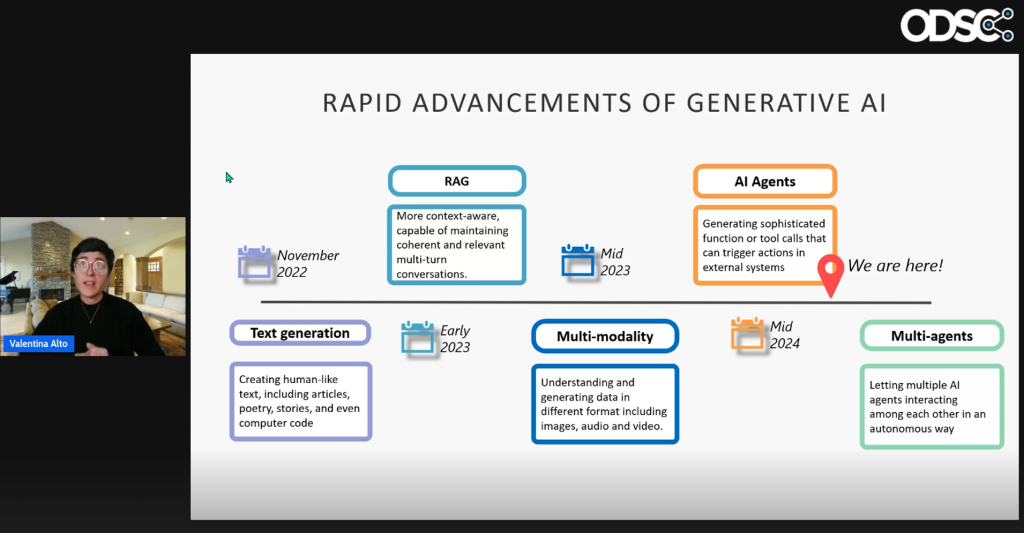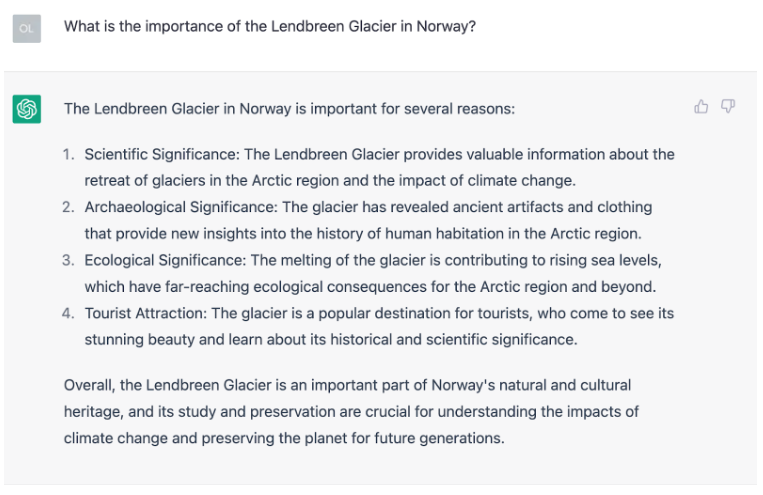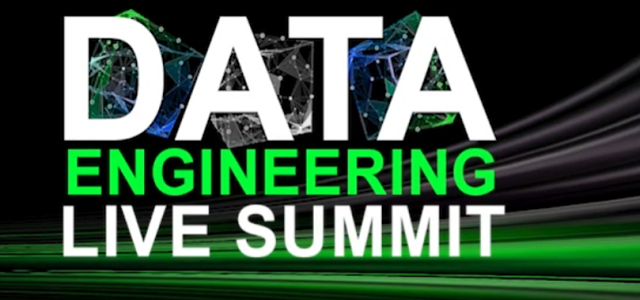Essential Insights from Week 3 of the AI Builders Summit: Exploring the Future of AI Agents
We have concluded week 2 of our inaugural AI Builders Summit! With hundreds of enthusiasts joining us virtually from around the globe, our exceptional instructors demonstrated effective strategies for maximizing the potential of your AI agents. Here’s a summary of the week’s sessions, and if you feel like you might be missing out, it’s not too late! You can still register for next week’s sessions focused on AI development and access these past sessions on-demand. Don’t forget to check out the recaps from previous weeks here and here.
AI Agents – A Practical Implementation
Valentina Alto, Technical Architect, AI & App at Microsoft
In her session, Valentina Alto delved into the swift advancements in generative AI witnessed over the last two years, illustrating the journey from basic text creation to the emergence of sophisticated AI agents. She meticulously unpacked the architecture of AI agents, stressing the vital roles of memory, knowledge bases, and tool integration. A significant theme was the transformation from conventional conversational AI to agentic applications that can autonomously manage complex tasks. The session featured a hands-on demonstration, where participants built an AI agent from scratch utilizing blockchain technology for orchestration. Furthermore, Valentina introduced concepts like retrieval-augmented generation (RAG) and vector search, clarifying how embeddings enrich contextual comprehension within AI agents. She wrapped up the talk with best practices for crafting AI-driven applications, ensuring a balanced approach between autonomy and responsible AI use.
Building Agentic RAG with LlamaIndex Workflows
Laurie Voss, VP of Developer Relations at LlamaIndex
Laurie Voss offered an in-depth exploration of LlamaIndex, a framework adept at linking structured data with large language models (LLMs), thereby facilitating efficient retrieval-augmented generation (RAG) and multi-agent orchestration. He guided attendees through the process of implementing AI agents utilizing LlamaIndex, discussing essential topics such as agent workflows, state management, and the integration of human-in-the-loop interactions. Laurie’s interactive workshop detailed the creation of a multi-agent system where participants collaborated to research, write, and critique reports. He also introduced the concept of workflow-based orchestration, which empowers developers to design flexible, modular AI applications featuring branching logic, parallel execution, and self-aware agents. By emphasizing scalability, Voss highlighted LlamaIndex’s capacity to synchronize with vector databases and various LLM providers, simplifying the integration of AI technologies in enterprise environments.
Modern AI Agents from A-Z: Building Agentic AI to Perform Complex Tasks
Sinan Ozdemir, AI & LLM Expert | Author | Founder + CTO at LoopGenius
Sinan Ozdemir provided an extensive overview of agentic AI, detailing foundational concepts, design philosophies, and pivotal frameworks needed to create autonomous AI systems. He analyzed the four elemental components of AI agents: task definition, tool utilization, constraints and rules, along with structured prompts. Different paradigms promoting agentic behavior were also discussed, including planning-oriented strategies, self-reflection mechanisms, and dynamic tool invocation. Ozdemir noted that while existing frameworks like CrewAI and LangChain offer built-in agent functionalities, developers can craft their own lightweight agentic systems by prioritizing modularity and flexibility. He wrapped up with best practices for deploying AI agents in real-world scenarios, focusing on ensuring robustness, adaptability, and ethical considerations in AI deployment.
Using World Models to Build AI Agents for Optimal Decision-Making
Dr. Andre Franca, CTO of Ergodic
Dr. Andre Franca examined the innovative concept of world models, providing a framework for AI agents to make optimal decisions within uncertain environments. He highlighted the importance of AI agents creating a mental map of the world prior to acting, reflecting states as contextual knowledge that evolves continuously. His session introduced a simulation-based methodology where AI agents progressively explore potential actions, assess their outcomes, and refine decision-making tactics. Dr. Franca demonstrated how LLMs can function as world models, showcasing a simple reinforcement learning agent that learns from historical data through a stepwise state-action transformation. He also discussed the limitations of reinforcement learning in agentic AI, advocating for hybrid models combining symbolic reasoning with data-driven methodologies to improve real-world applicability.
LLM Engineering Masterclass: Select and Apply LLMs Using RAG, Fine-tuning, and Agentic AI
Edward Donner, Co-founder and CTO of Nebula.io
Ed Donner delved deeply into LLM engineering, focusing on selecting, optimizing, and deploying large language models for practical applications in AI. He introduced workflows utilizing multi-agent AI, where different LLMs work collaboratively in decision-making processes. The session highlighted retrieval-augmented generation (RAG), fine-tuning techniques with QLoRA, and agentic AI frameworks that enhance model performance. Donner illustrated a multi-step pipeline using DeepSeek, showcasing a structure where 23 different LLM calls per decision contribute to creating a highly autonomous AI agent. Participants engaged in a workshop, where they built an e-commerce AI assistant capable of selecting the most effective LLM for various natural language processing tasks. He emphasized the significance of balancing cost and performance, evaluation strategies, and practical deployment considerations.
Building and Evaluating an Agentic RAG Application with LangGraph
Greg Loughnane, Co-Founder & CEO at AI Makerspace
Chris Alexiuk, Head of LLMs at AI Makerspace | Founding Machine Learning Engineer at Ox
In this collaborative session, Chris and Greg tackled the practical aspects of implementing AI agents in business settings. They broke down AI tasks into structured agent workflows with decision trees composed of modular components. Discussion centered around the use of autonomous agents that employ both rule-based and machine learning techniques, underlining the crucial role of self-reflection in AI processes. Their demonstration featured multi-agent collaboration, where different LLMs assumed specific roles (like reasoning, verification, and retrieval) to enhance decision-making efficacy. The session concluded with a live coding demonstration deploying an AI agent within a customer segmentation case, leveraging causal inference, reinforcement learning, and real-time data adaptation to drive personalized marketing strategies.
Conclusion
On February 5th and 6th, we will conclude the AI Builders Summit with a variety of workshops and quick demos showcasing how to utilize many of the tools presented during the event.
- AI Q&A + Live-Speed-Build with Matt Shumer
- From Idea to Implementation: How to Self-Host an AI Agent
- Cloning NotebookLM with Open Weights Models
- Building a Data Analyst AI Agent from Scratch
- Creating AI Agent Workflows: Automating Research Papers to Podcasts
- Design Your Own Enhanced LLM-Powered Slackbot and Save Thousands
- Real-World Workflows for Addressing Everyday Challenges Using AI
- Run DeepSeek-R1
- Red Hat OpenShift AI – Predictive and Generative AI Demonstration
- Advancing GraphRAG: Multimodal Integration with Associative Intelligence
Register now to participate in next week’s sessions and gain access to all content from the past three weeks on-demand! For those seeking further hands-on training in AI, consider registering for ODSC East, taking place from May 13th to 15th, where attendance includes access to the AI Builders Summit.
Agent Architecture: A New Frontier in AI
This session delved into the intricate architecture of AI agents, highlighting vital components such as memory management, knowledge bases, and tool integration. A significant emphasis was placed on the transformative shift from conventional conversational AI to sophisticated agentic applications, which can autonomously execute complex tasks. Demonstrating the practical aspects, a hands-on workshop was held where participants built an AI agent from scratch, utilizing blockchain for orchestration. The presentation introduced innovative concepts like retrieval-augmented generation (RAG) and vector search, illustrating how embeddings significantly enhance the contextual comprehension of AI agents. The session wrapped up with valuable insights into best practices for crafting AI-driven applications while balancing autonomy and responsible AI standards.
Creating Agentic RAG with LlamaIndex Workflows
In an insightful session, Laurie Voss offered an in-depth exploration of LlamaIndex, a robust framework designed to connect structured data with large language models (LLMs). This connection facilitates effective retrieval-augmented generation (RAG) and the orchestration of multi-agent systems. Participants were guided through the implementation of AI agents using LlamaIndex, focusing on agent workflows, state management, and incorporating human-in-the-loop interactions. A hands-on workshop showcased the development of a multi-agent system where agents collaborated to research, compose, and critique reports. Voss emphasized the advantages of workflow-based orchestration, enabling developers to create adaptable and modular AI applications featuring branching logic, parallel execution, and reflective agents. His demonstration highlighted LlamaIndex’s capability to integrate seamlessly with vector databases and various LLM providers, which is crucial in advancing enterprise AI integration.
From Concept to Execution: Building Modern AI Agents
Sinan Ozdemir delivered a comprehensive overview of agentic AI, detailing foundational concepts, design principles, and critical frameworks vital for constructing autonomous AI systems. He examined the four essential components of AI agents: task definition, tool utilization, established rules and constraints, along with structured prompts. Different paradigms for agentic behavior were discussed, such as planning-based strategies, reflective processes, and dynamic tool invocation. Ozdemir pointed out that while existing frameworks like CrewAI and LangChain provide ready-to-use functionalities for agents, developers are encouraged to create their own lightweight agentic systems by prioritizing modularity and flexibility. The session concluded with tactical advice for deploying AI agents in real-world scenarios, ensuring they are robust, adaptable, and ethically sound.
World Models: Enabling AI Agents for Superior Decision-Making
Dr. Andre Franca focused on the significance of world models as a framework for AI agents to make informed decisions in environments filled with uncertainties. He underscored the necessity for AI agents to develop a representation of their surroundings before taking action, portraying states as evolving contextual knowledge. Presenting a simulation-based methodology, he outlined how AI agents systematically explore potential actions, assess their consequences, and refine their decision-making strategies. Franco showcased the application of LLMs as world models through the development of a simple reinforcement learning agent, which adjusts its actions based on historical data via a stepwise state-action transformation. He also addressed the limitations of reinforcement learning within agentic AI, advocating for hybrid models that merge symbolic reasoning and data-driven learning to enhance practical applicability.
Mastering LLM Engineering: RAG, Fine-tuning, and Agentic AI
Edward Donner conducted a detailed session on LLM engineering, encompassing the selection, optimization, and deployment of large language models (LLMs) for practical AI use. He introduced workflows that leverage multiple AI agents cooperating in decision-making processes. The discussion explored the mechanics of retrieval-augmented generation (RAG), fine-tuning techniques using QLoRA, and frameworks for agentic AI to bolster model efficacy. Donner demonstrated a multi-step LLM pipeline employing DeepSeek, integrating 23 distinct LLM calls per decision to engineer a highly autonomous AI agent. A practical workshop allowed participants to develop an e-commerce AI assistant capable of flexibly selecting the most suitable LLM for various natural language processing tasks. He stressed the importance of balancing cost and performance, exploring evaluation techniques, and real-world deployment factors.
Evaluating Agentic RAG Applications with LangGraph
In a collaborative presentation, Chris Alexiuk and Greg Loughnane shared insights on effectively implementing AI agents within business environments. Focusing on structured agent workflows, they broke down AI tasks into decision trees with modular components. Key discussions highlighted the use of autonomous agents driven by rule-based and machine learning methods, emphasizing the role of self-reflection mechanisms in AI processes. They illustrated the concept of multi-agent collaboration, where different LLMs assume various roles, such as reasoning, verification, and retrieval, to enhance decision-making efficiency. The session culminated with a live coding demonstration, showcasing the deployment of an AI agent in a customer segmentation case, utilizing causal inference, reinforcement learning, and real-time data adaptation to tailor marketing strategies.
Conclusion
Mark your calendars for February 5th and 6th as we conclude the AI Builders Summit with a series of engaging workshops and demonstrations highlighting diverse tools showcased throughout the event.
- AI Q&A + Live-Speed-Build with Matt Shumer
- From Idea to Implementation: How to Self-Host an AI Agent
- Cloning NotebookLM with Open Weights Models
- Built a Data Analyst AI Agent from Scratch
- Building AI Agent Workflows: Automating Research Papers to Podcasts
- Create a better LLM-powered Slackbot and Save Thousands
- Real-World Workflows for Everyday AI Solutions
- Run DeepSeek-R1
- Red Hat OpenShift AI – Predictive and Generative AI Demo
- Advancing GraphRAG: Multimodal Integration with Associative Intelligence
Don’t miss out—register today to join next week’s sessions and access everything from the past three weeks on demand! For those seeking further hands-on AI training, consider registering for ODSC East this May 13th-15th, which includes access to the AI Builders Summit.






